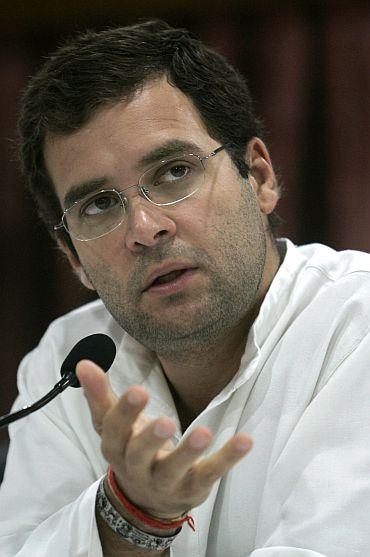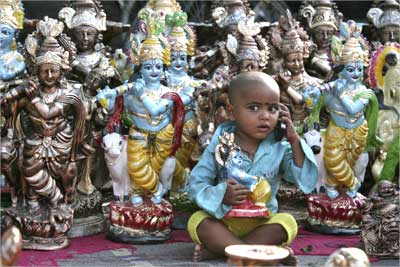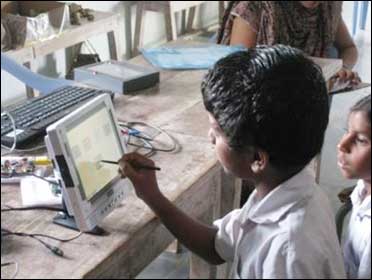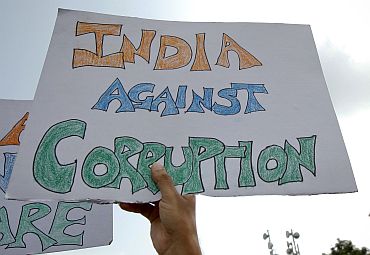
The opening speech Congress General Secretary Rahul Gandhi gave while chairing the Rajiv Gandhi Institute of Contemporary Studies' 20th anniversary lecture -- Globalisation, Justice and Rights, which was delivered by Professor Thomas Pogge of the Yale University.
Honourable ministers, Honourable members of Parliament, Prof Pogge, Prof Basu, Mrs Priyanka Gandhi Vadra, Trustees of the Rajiv Gandhi Foundation, Prof Gopal, dignitaries, ladies and gentlemen, I am delighted to be here this evening.
The Rajiv Gandhi Institute of Contemporary Studies is completing 20 years of its existence this year. RGICS has worked in a wide range of areas in these twenty years. As it enters its third decade, RGICS has embarked on a renewal program with a new vision and strategy. I hope and expect that the renewed RGICS will enrich our thinking and make important contributions to public policy.
Let me turn to the topic of the evening, "Globalisation, Justice and Rights". Globalisation is not new. Ideas, objects and people have moved across the world since time immemorial.
Two examples:
A sermon spoken to an audience of five souls in a deer park in North East India in 600 BC spread across the plains far beyond the park, beyond oceans and mountain passes. It spread as a message of compassion and non-violence – easily trespassing borders a couple of millennia before social media was conceived in the spacious dorm rooms of Mark Zukerberg and company.
And then, about a hundred years ago, Gandhiji unleashed an idea that galvanised spirits across continents; moved countless hearts and dismantled an empire.
There is an arrogance in claiming that globalisation is new, as if we've only just invented it. Every generation feels there is an onus on them to come up with something newer, faster, better.
But globalisation doesn't belong to our generation; it is a process that has been going on since the time we first spoke our minds. Like most definitions, this one blurs complexities. Definitions are guides but they are also traps. The term globalisation is like the equally ubiquitous war on terror.
They are both terms that capture everything and nothing at the same time. What is new is the speed with which ideas and people are travelling and coming into contact with each other.
...

Let me give you a small example. What are the similarities and differences between a bullock cart and a car?
The most obvious similarity is that they both allow us to move. They both have wheels, axles, seats (one is of course more comfortable than the other and if you've ever been in a bullock cart you'll know which one is more comfortable) and a source of energy or a fuel tank – in the case of the bullock cart, the bull's stomach and fat reserves.
Less exciting, but simple and efficient.
But, now for the difference.
What separates them is the number of ideas that have coalesced to shape their final form. A car is the product of a larger conglomeration of ideas than a bullock cart. The idea of transport -- of getting from one point to another -- is revolutionised by the car.
So in this paradigm, high technology is nothing more complicated than a higher density of ideas. Added to the original blueprint of axles and wheels, you now have the combustion of fuel, a drive train, tires with compressed air and even a slot for your iPod.
These ideas come from a network of connectivity. The ideas and inputs that went into a bullock cart are all from the same square kilometer of land. The pedigree of the car is far more complex. The rubber probably came from Malaysia, was processed in Germany and assembled in Gurgaon.
The metal was mined in Bellary, processed in Japan and imported by a Korean ship. The fuel may have been extracted in Saudi Arabia by European engineers and driven to the petrol pump by a trucker from Punjab.
You get what I mean.
You think you're sitting comfortably on a car seat, but what you don't realise is you're perched upon a perpetually running global network whose collective memory is expanding explosively.
...

Now lets move to India.
India in 1947 was a different place. There was only one India 60 years ago and it was poor. Almost all of it lived in villages and did not have access to the basic requirements of food and shelter.
That India was completely unconnected, both internally and externally. Knowledge was trapped in numerous silos, principal among them a rigid caste system that defined everyone's place in society.
The mobility of ideas, people and objects was severely restricted for millennia by that rigid caste system. Even the tools of knowledge and communication were restricted to an elite minority.
But India has changed. It has been changing over the last 60 years. It is changing as we speak. We are seeing the birth of a new India, mobile and dynamic. It is an India that is rapidly connecting across social and physical barriers. An India where information is finally beginning to flow.
But that does not mean that our success is inevitable.
...

Globalisation excludes as much as it includes. There are millions left out of the process, millions who do not benefit from globalisation and millions more who are damaged by its asymmetric application of power.
The local networks that protected them no longer exist. The worker from Kerala who extracts the oil that is the life force of the car, cannot afford to drive it home to his children. Every time you turn your key in the ignition, you are sucking oil out of that well in Saudi Arabia.
If there is no oil in that well, you don't have a car and the man who extracts the oil, can no longer feed his children. The farmer in Vidarbha drinks pesticide as global Cotton prices tumble. The little tribal boy walks past a housing colony built on top of his home never to set foot in it again.
Let's move to migration for a minute. Migration is converting India from a static, village based society into a mobile urban one. Today's migration is tremendous and dynamic, but it is a process that leaves people bereft of justice and of rights. It is a process that involves young fathers sleeping on footpaths in new cities. A process accompanied by voiceless women being sold silently in the shadows.
The only constant in our world is change – this has always been true. Change challenges the status quo.
...

Our current concepts of justice and rights have been structured for static societies. We must think about how these concepts will need to change with increased connectivity and movement. Take for example the vote, our most basic instrument of empowerment and justice.
An instrument that gives India its voice. What does it imply for us as a just nation when we cannot guarantee a migrant seamless access to franchise? The same problem also suggests where the solutions lie - in innovations such as the Unique ID, which allow us to know and therefore guarantee a voice to every individual.
Like globalisation, there is another idea that has been around for thousands of years. It is the same idea that was spoken about in the deer park in Sarnath.
An idea that has always been the basis of justice and rights, it is the idea of compassion. Compassion comes from understanding that we are all part of the same system - I am you and you are me.
Compassion allows us to see that the rights of others are as important as our own. Like change, we must ensure that the idea of compassion is always with us.
It is in the context of these challenges that I take pleasure in welcoming Dr Pogge to India, and the Rajiv Gandhi Institute of Contemporary Studies. I am sure his talk here will provide us with fundamental insights to help interpret and navigate the waters of our time.